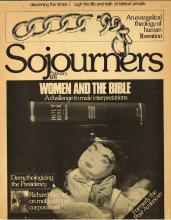Moments after the Rev. William Wendt was sentenced by the Bishop of Washington for ecclesiastical disobedience (having invited the Rev. Alison Cheek, one of the women who has been ordained to the Episcopal priesthood, to preside at the Eucharist), Cheek remarked publicly that Wendt had been rendered a scapegoat.
“His conscience,” she declared, is blamed for the default, for the cowardice, for the vanity of others. ... He is sentenced while 46 other male priests in the 12 dioceses who might have been similarly charged are ignored ... He is punished because I am a priest. Instead of sentencing Bill Wendt ... Bishop Creighton (should) ... have caused charges to be brought against me …”
She spoke the truth. Wendt, along with the Rev. Peter Beebe, similarly put to trial in Ohio, bears the burdens of others, suffers as a surrogate for others, and intercedes for others--including, the Bishop of Washington--in his conviction and punishment.
Since July of 1974, when the first women were ordained in Philadelphia, no charges have been lodged against any of the principals participant in that event--neither any of the women ordained, nor any of the ordaining bishops. This omission persists despite the redundant public admissions of the principals that there was canonical irregularity--though not sacramental invalidity--in the ordinations. The refusal of the church management to allow charges against the principals flouted the law of the Episcopal Church and made the proceedings against Wendt a legal anomaly from the outset because an accessory was prosecuted before any offense by any principal had been established.
So, at the trial, at which most of the women priests were present in person, Alison Cheek and her peers endured the penultimate put-down of beholding someone else--a male priest, at that--held accountable and put in jeopardy instead of themselves.
Read the Full Article

